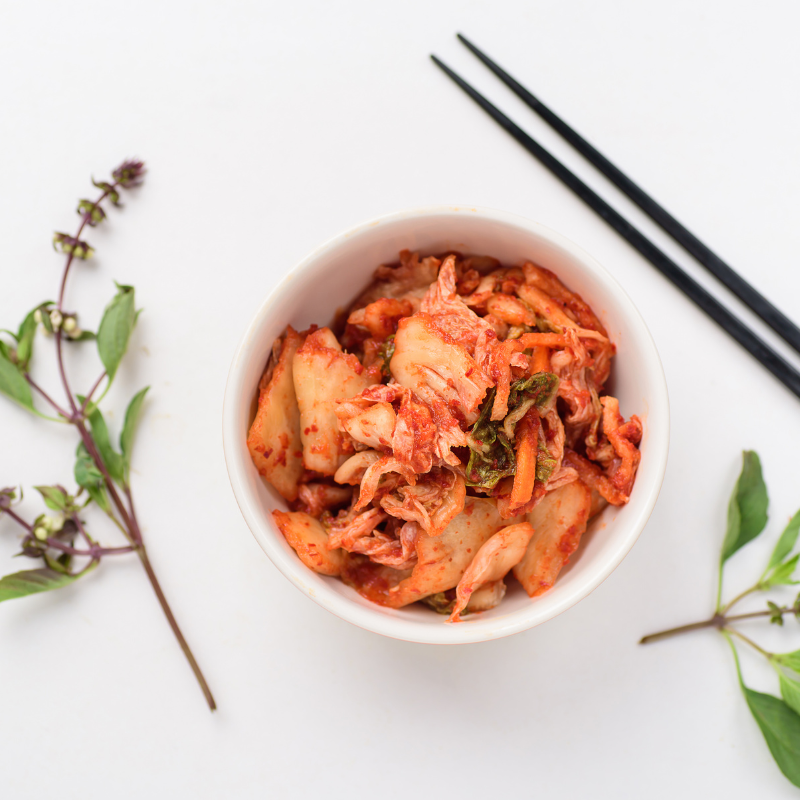In recent years, kimchi has risen from a traditional Korean side dish to global superfood status. This vibrant, tangy fermented vegetable dish isn’t just delicious—it’s packed with health benefits that have caught the attention of researchers and food enthusiasts worldwide. Let’s dive into what makes kimchi so special and why it deserves a place in your refrigerator.

What Is Kimchi?
Kimchi is Korea’s most iconic fermented food, traditionally made from napa cabbage and radishes seasoned with chili powder, garlic, ginger, and other ingredients. While cabbage kimchi (baechu kimchi) might be the most recognized variety, there are actually hundreds of kimchi varieties in Korean cuisine, varying by region, season, and main ingredients.
The fermentation process is key to kimchi’s unique flavor profile and health benefits. During fermentation, beneficial bacteria transform the vegetables, creating that distinctive tangy taste and preserving the vegetables for long-term storage.
The Cultural Significance of Kimchi
More than just food, kimchi represents Korean identity and cultural heritage. The tradition of kimjang—the communal practice of preparing large batches of kimchi for the winter months—was recognized by UNESCO as an Intangible Cultural Heritage of Humanity in 2013.
This annual tradition brings families and communities together to prepare enough kimchi to last through the winter. It’s a beautiful example of Korean communal spirit and practical food preservation wisdom passed down through generations.

The Science-Backed Health Benefits of Kimchi
1. Probiotic Powerhouse for Gut Health
Kimchi is teeming with beneficial bacteria, particularly lactic acid bacteria like Lactobacillus. These probiotics help maintain a healthy balance of gut microbiota, which is essential for:
- Improved digestion
- Enhanced nutrient absorption
- Stronger immune function
- Reduced gut inflammation
Research shows that regular consumption of fermented foods like kimchi can significantly improve digestive health and may help with conditions like irritable bowel syndrome.
2. Weight Management and Metabolic Health
Several studies have linked kimchi consumption to improved weight management. One notable study found that participants who consumed kimchi regularly showed significant decreases in body weight, BMI, and body fat percentage compared to control groups.
The beneficial bacteria in kimchi appear to influence metabolism in positive ways, potentially helping to regulate appetite and improve the body’s ability to process nutrients efficiently.
3. Heart Health Benefits
Kimchi may be good for your heart, too. Research indicates that consuming about 1.5 cups of kimchi daily can help improve vascular health in people with elevated cholesterol levels.
The dietary fiber and antioxidants in kimchi work together to:
- Reduce bad cholesterol levels
- Improve circulation
- Lower blood pressure
- Reduce inflammation in blood vessels
4. Anti-inflammatory and Antioxidant Effects
The fermentation process of kimchi creates various metabolites with powerful anti-inflammatory and antioxidant properties. The vitamin C and other antioxidants in kimchi help fight oxidative stress, which is linked to heart disease, cancer, and accelerated aging.
The bright red color in many kimchi varieties comes from capsaicin (from chili peppers), which has been shown to have anti-inflammatory effects throughout the body.
5. Mental Health Connection
Emerging research in the field of nutritional psychiatry suggests a connection between fermented foods like kimchi and mental health. The gut-brain axis—the communication network between your digestive system and your brain—appears to be influenced by the probiotic bacteria found in fermented foods.
Some studies indicate that a healthy gut microbiome supported by probiotic-rich foods may help reduce symptoms of anxiety and depression and improve overall mood.

Adding Kimchi to Your Diet
If you’re new to kimchi, here are some easy ways to incorporate it into your meals:
- Enjoy it as a side dish with rice or noodles
- Add it to scrambled eggs or omelets
- Use it as a topping for burgers or sandwiches
- Mix it into fried rice or stir-fries
- Include it in savory pancakes or dumplings
- Try it in soups and stews for depth of flavor
For beginners, start with small amounts, as the flavor can be intense. You can find kimchi in most Asian grocery stores and increasingly in mainstream supermarkets. Look for varieties with live cultures for maximum probiotic benefits.
The Global Rise of Kimchi
What was once a distinctly Korean staple has now become a global phenomenon. Since the mid-20th century, kimchi has steadily gained international recognition, becoming the most emblematic Korean food worldwide.
Its rise in popularity coincides with growing interest in fermented foods, probiotics, and traditional food preservation methods. As more people discover the unique flavor profile and health benefits of kimchi, its presence on global menus continues to expand.
Kimchi represents the perfect intersection of delicious flavor, cultural significance, and evidence-backed health benefits. As both an ancient tradition and modern superfood, it offers a taste of Korean heritage while providing numerous advantages for gut health, weight management, cardiovascular health, and potentially even mental wellbeing.
Whether you’re a seasoned kimchi enthusiast or curious first-timer, this remarkable fermented food deserves recognition for its contributions to both culinary enjoyment and nutritional science. As research continues to unveil more benefits, kimchi’s reputation as a true superfood only grows stronger.